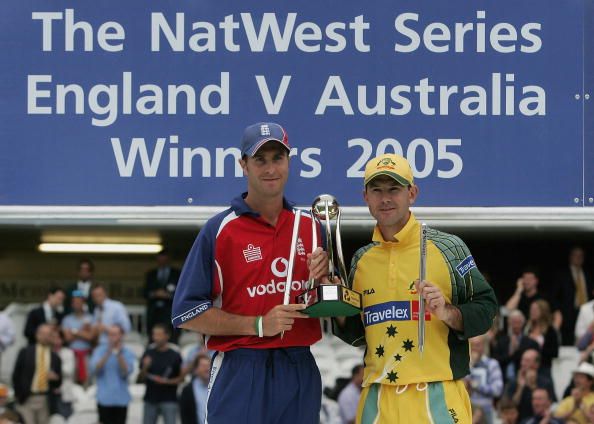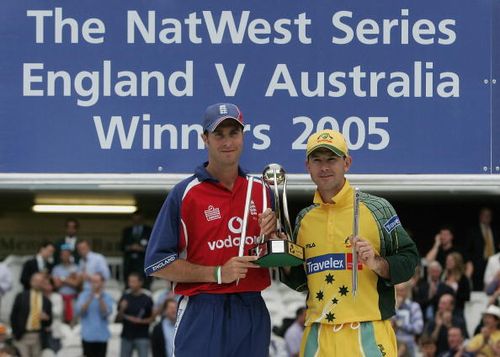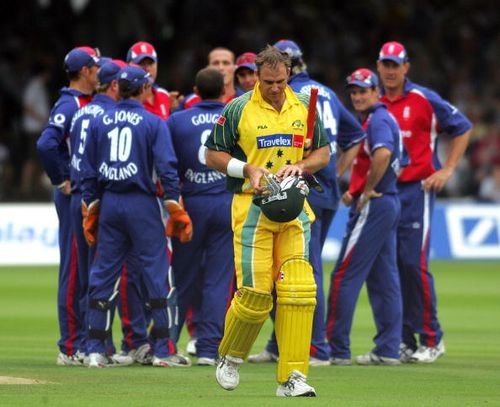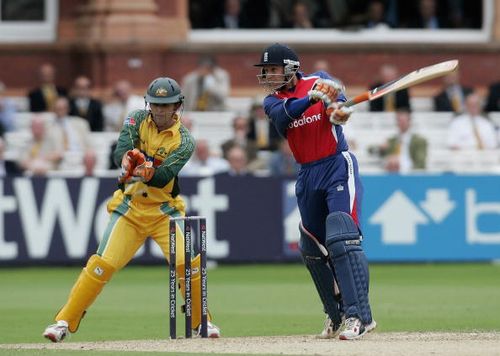
Cricket's Closest Contests: England vs Australia, 2005 Natwest final

If you really think that only physical exercise could heighten the rate of your heart beat, I’d suggest you start watching cricket! An aficionado who has encountered a high pressure, live-wire game would agree that Limited Overs cricket could do that to you in a jiffy! Cricket has had its fair share of electrifying on-field climaxes over the years that could metamorphose an inane cricket hater to a die-hard fan overnight.
The rivalry:
The rivalry between Australia and England dates back to more than a century when the Australians drew first blood by humiliating the Englishmen at their own backyard. England in return, traversed to Australia to pay the dues. Since then, both the teams have been at each other’s throat. Right from the famed Bodyline series to a 5-0 Ashes drubbing, they have seen it all. Any encounter amongst these two teams is deemed as the ultimate battle for pride and honour. It was a similar case on the 2nd of July 2005 when the mighty Australians took on a resurgent England in the Natwest Trophy Final.
Australia:
Australia had almost patented the winning ways and were hell bent on beating the opponents into submission. They had a dream run under the captaincy of Ricky Ponting who seemed to be following the precedent set by Steve Waugh. Australian cricket was flourishing under the able guidance of the seniors, combined with a right mix of youth.
England:
England was a determined lot, aiming at upsetting Australia’s preparation for the Ashes that were to follow. They were a wilting side, their bowling unit looking antique and batting being raw and unpolished. Kevin Pietersen was still finding his feet and Andrew Flintoff was at the crossroads of his career.
The toss: (overcast conditions)
The conditions were favourable for bowling and the toss was vital. Michael Vaughan won the toss and put the Australians to bat, knowing that they would have the conditions backing them up. And they sure did.
The encounter:
Adam Gilchrist and Matthew Hayden walked out to bat in overcast conditions. They knew that a solid start was the need of the day and went about the task in their own slam-bang fashion. Australia brought up its first half-century partnership in the seventh over without breaking a sweat. Despite the conditions suggesting otherwise, the duo, especially Gilchrist, made batting look easy, the scoring rate being way too healthy for the pitch until Gough stepped in.
Bowling in the seventh over, Gough snapped up the wicket of Hayden who was starting to get his eye in at 17. The partnership was broken and England had drawn the first blood. With Ponting and Gilchrist departing soon, things started to look ominous as Australia was three wickets down for 73 runs by the end of the 13th over. An indication of the collapse was on the cards when they were reduced to 93/5 at the half way stage.

As things stood, it was an uphill task for the Aussies to achieve a respectable total. That responsibility was handed over to Andrew Symonds and Michael Hussey. Resurrection looked nigh impossible, but Hussey was patient and calculative as he worked his way around the England bowlers. It was a shame that England were not able to close out the innings fast once they set the ball rolling. Hussey (62*) was at his patient best as he played around the tail to aid them in reaching 196 at the end of the first innings.
“There is many a slip between the cup and the lip.” - The old English proverb implies that even if the outcome of an event seems certain, there’s a possibility of things going wrong, horribly wrong. The English batsmen, were to soon know it first hand.
England was supposed to make mince-meat of the total. England came out imagining one hand on the trophy when Australia abruptly turned on their effervescent magic. What followed was a disaster for England and a complete thriller for the fans. The collapse started with Marcus Trescothick who edged a brilliantly bowled out-swinger by Mcgrath to Ponting at slips. Strauss, Vaughan, Flintoff and Pietersen followed soon without troubling the scorers much. England was tottering at 33/5 by the end of the 10th over and the trophy was now looking a distant dream. Glenn Mcgrath and Brett Lee were breathing fire and they showcased their class against a crumbling English batting order.
It was a painful sight for the fans present at the stadium to see England failing to grab an excellent chance to defeat their arch-rivals. It looked like the Australians were going to run away with the match, thanking the almighty for the reprieve they got after their batting failure.
But not for Paul Collingwood and a nervy bunch of lower order batsmen led by the wicket-keeper Geraint Jones.
It was another instance of the overwhelming twists and turns that kept the audience on the edge of their seats. Paul Collingwood was rock-solid and Geraint Jones provided the much needed stability to take the attack back to the opposition. They pulled anything short and made use of any width that was on offer. They played around cautiously without giving anything away and brought the hundred run partnership, much to the relief of the English supporters. Geraint Jones reached his half-century in the process, the third of his short career.

The recovery did not last long enough though. Paul Collingwood was the victim of a bizarre run out in the 43rd over. He hit a full-toss from Michael Hussey to the covers and started running. Andrew Symonds was quick enough and Collingwood slipped while attempting to turn-back. He departed for a well-made 53(116).
England 149/6, need 48 off 39.
Ashley Giles joined Jones in the middle and started off well with consecutive fours. The duo added another 3 runs before Hogg struck to remove Jones after he had made 71, in the 45th over.
England 161/7, need 35 off 30. Australia need three wickets.
Simon Jones came next but went without troubling the Aussies much, the pendulum slowly shifting towards the Australian. Gough and Giles added a few more singles.
England 168/8, need 28 off 18. Australia need two wickets.
Ponting courageousness as a captain is a known attribute. He proved it once again by handing the ball to a part-timer Michael Hussey in the 48th over. It could have been a complete disaster had a top-order batsman been in the middle. He was wayward and gave away nine crucial runs. It could have been worse. Hussey was plain lucky. Giles hit a crucial boundary in the 49th over by Lee and brought the target down.
England 187/8, need 10 off 6 balls. Australia need two wickets.
The gritty tail-enders brought the equation down to 10 runs off the last over. It was an intense affair as both the teams clung on to the match as though their life depended on it. It would be clichéd if the word ‘thriller’ is used here. It was a tad more, for not a breath was wasted in the mundane happenings around. The “shh’s” was the only noise audible from the crowd who wanted to soak in the experience of this encounter.
McGrath was handed over the responsibility of bowling the last over. The best possible choice for any skipper was to throw the ball at someone like Mcgrath and expect him to deliver the goods. Ponting didn’t even have to think twice as the audience waited with bated breath.
The first ball was a no-ball and the batsman sneaked a single off it. The pressure was building slowly and it was only a matter of time before it boiled over.
Ashley Giles and Darren Gough (12) tried to carry the match to the very last ball. Needing three off the final delivery, Giles was able to manage just two and the match was tied to everybody’s surprise.
The match oscillated like a pendulum throughout the day and halted at the dead centre at the end of it. The crowd, obviously thrilled after witnessing the kind of fight England had shown after being 33/5, eventually had to go home with a sour taste in the mouth, having been denied victory didn’t seem a distant dream at the start of the 2nd innings. Geraint Jones was rightly chosen as the Player of the Match for being the lynchpin in an unexpected fight back by the English.
The equation had many singles and doubles between the lines and the people left the analysis to the experts to determine who had actually let the match slip away. But even they were unable to gauge a straightforward answer. Such was the impact of this match that the players would have found it hard to go to bed that night.
It could have been anybody’s game.
Teams:
Australia: Adam Gilchrist (Wk), Matthew Hayden, Ricky Ponting (C), Damien Martyn, Andrew Symonds, Michael Clarke, Michael Hussey, Brett Lee, Jason Gillespie, Brad Hogg, Glenn McGrath.
England: Marcus Trescothick, Andrew Strauss, Michael Vaughan (C), Kevin Pietersen, Andrew Flintoff, Paul Collingwood, Geraint Jones (Wk), Ashley Giles, Simon Jones, Darren Gough, Steve Harmison.